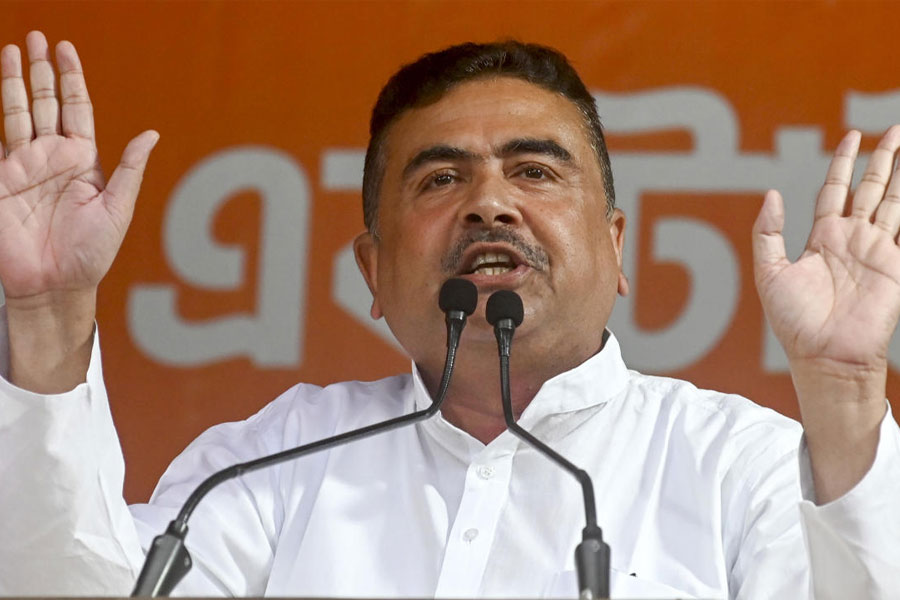Senior BJP leader Suvendu Adhikari has warned that India knows how to "deal with Bangladesh" if it does not rectify its course, as allegations of atrocities against Hindus in the neighbouring country ignited protests on this side of the border.
Bangladesh relies on India and not the other way around, Adhikari asserted, emphasising India’s leverage in the region.
Addressing a rally at Basirhat’s Hajratala more near Indo-Bangla border, Adhikari who is the Leader of the Opposition in West Bengal Assembly, demanded immediate cessation of violence against minorities and called for raising the issue at international forums.
Adhikari cited an alleged attack on an ISKCON member in Dhaka's Uttara area recently, where the victim reportedly narrowly escaped an attempt on his life.
Videos of the incident, shared widely on social media by the group Save Bangladeshi Hindus, have triggered widespread outrage among Hindu communities.
“If we stop electricity supply, they will plunge into darkness. We have 40 fighter jets stationed at Hasimara and sending two will suffice. Our Prime Minister resolved the Ayodhya dispute and abrogated Article 370. Bangladesh should not test our patience. We sacrificed 17,000 soldiers to help them gain independence in 1971. If necessary, we will act again,” he said.
Protests have escalated in West Bengal, with organisations like the Bengali Hindu Protection Committee holding demonstrations at Petrapole and Ghojadanga border points.
Protesters demanded urgent action to end the alleged persecution of Hindus in Bangladesh and urged the Indian government to intervene.
Adhikari's remarks, made during a protest rally, came amid rising tension over the safety of Hindus in Bangladesh and the growing number of attacks on their religious establishments.
Adhikari also reiterated his support for Sheikh Hasina as the "only legitimate Prime Minister of Bangladesh," a statement that has drawn mixed reactions amid the ongoing political turbulence in the neighbouring country.
His remarks have amplified calls for international intervention to address the concerns of Hindu minorities in Bangladesh.
The BJP leader warned the Bangladesh government, led by chief adviser to the interim government Muhammad Yunus, of escalating economic pressure.
He threatened to impose an "indefinite export embargo" on the neighbouring country if it did not take immediate steps to curb attacks on the Hindu minority.
“Trade restrictions with Bangladesh will be tightened in phases, crippling the country’s dependence on essential commodities from India," Adhikari declared.
"The 24-hour suspension of trade was just a trailer of what’s going to happen next. If the attacks on Hindus and their religious institutions do not stop by next week, we will impose a five-day trade embargo. After the beginning of next year, we will stop trade for an indefinite period. We will see how the people there live without our potatoes and onions,” he added.
Adhikari's remarks were part of a protest organised to demand the release of Hindu monk Chinmay Krishna Das, who was arrested in Bangladesh, and to call for an end to the ongoing persecution of religious minorities in the country.
Adhikari said, “If they dishonor our flag, we will force the new sons of Rajakars (pro-Pakistan militia) in Bangladesh to surrender just like we did in 1971 when we brought the Pakistani military to its knees.” The Hindu community in Bangladesh, the country’s largest minority group, has faced increasing persecution, particularly after a period of political upheaval.
The situation has worsened following the resignation of Prime Minister Sheikh Hasina on August 5, triggered by widespread student protests.
Chinmay Krishna Das, a prominent spokesperson for Bangladesh Sammilita Sanatani Jagran Jote, was arrested at Dhaka’s Hazrat Shahjalal International Airport on Monday while en route to Chattogram for a rally. He was denied bail and remanded to jail on Tuesday. His arrest has further fueled concerns over the treatment of Hindus in Bangladesh.
Historically, Hindus made up around 22 per cent of Bangladesh’s population during the 1971 Liberation War. However, their numbers have dwindled over the decades, with the community now comprising only about 8 percent of the total population. This decline has been attributed to a combination of socio-political marginalization, mass migration, and sporadic violence targeting Hindus.
Except for the headline, this story has not been edited by The Telegraph Online staff and has been published from a syndicated feed.











